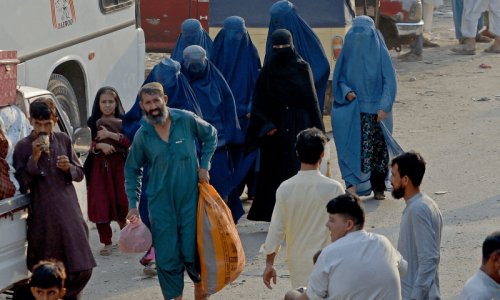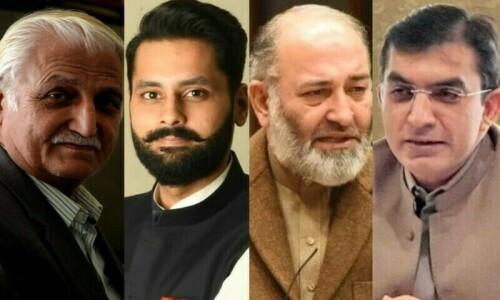PESHAWAR: The Peshawar High Court on Wednesday wondered how the United Nations High Commissioner for Refugees could register Afghan refugees, who entered the country in the last two and three years, without the consent of Pakistan’s government, and sought the response of authorities about the matter today (Thursday).
Deputy attorney general Hazrat Said and assistant director (legal) of the Federal Investigation Agency (FIA) Abdur Rehman were directed by a bench consisting of Justice Abdul Shakoor and Justice Syed Arshad Ali directed deputy to inform it about the government’s policy on the registration of new refugees by the UNHCR.
The bench was hearing a joint petition filed by three Afghan singers, who sought its orders for the government against deporting them insisting they’ll be persecuted in the Taliban-ruled Afghanistan.
Petitioners Hashmatullah Omed, Rafi Hanif and Hameed Shahdai said they were singers by profession and lived in Pakistan as refugees.
Seeks govt’s response on matter
Their counsel, Mumtaz Ahmad, claimed that after the takeover of Afghanistan by the Taliban, life for artists in the country was very dangerous and miserable as the government had announced that it wouldn’t tolerate such activities.
He added that like thousands of other Afghans, they fled their country along with families and lived in Pakistan.
The lawyer said that the petitioners and their families were registered by the UN refugee agency, which gave them a token number.
He said Pakistan’s government had adopted the policy of forced return for refugees to Afghanistan in violation of international law, protocols and agreements.
The bench asked the lawyer under which law or constitutional provision, his clients sought relief, and wondered they’re registered as refugees or not.
The counsel contended that under different international conventions, the government was bound not to deport petitioners.
Justice Arshad Ali wondered whether the UNHCR had the mandate to register fresh Afghan refugees without approval of the government.
The lawyer referred to a 2003 tripartite agreement between the government of Pakistan, Afghanistan and UNHCR saying under that agreement, there won’t be forced repatriation of refugees.
However, the bench observed that the status of petitioners was not that of refugees.
When the bench asked how the petitioners entered Pakistan, the counsel said his clients reached the country on valid visas, which later expired.
The bench observed how the petitioners could seek status of a refugee when they arrived in the country on proper travel documents.
It added that there was a lot of difference between the situation of Afghanistan in 2003, when the agreement was signed, and now as at that time, fighting was going on there but currently, a proper government was in place there.
The lawyer also produced an email from the UNHCR to the petitioners showing that they had been registered and their cases were passing through the screening process.
The bench asked him how the UNHCR could register them as refugees when they entered Pakistan on valid travel documents.
Justice Arshad Ali observed that when the petitioners didn’t have Proof of Registration cards, how they could move the court to block their repatriation.
The bench observed that it would be appropriate to ask the government about its policy on the matter.
Published in Dawn, November 2nd, 2023














































Dear visitor, the comments section is undergoing an overhaul and will return soon.